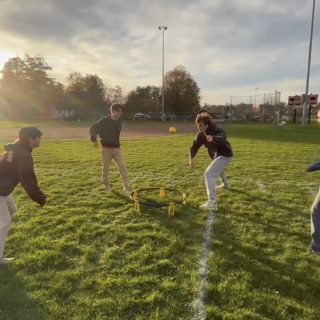Stressed out? When to cry, when to get outside, and how to find balance

In the busy routines of students and teachers, downtime can be hard to find. Those who turn in their academic assignments on time, are well-prepared for classes, and feel focused and organized need to do a lot of work to get there.
I spoke to students and teachers at ARHS about how they manage their time to learn some of their tricks and tips for staying healthy and happy and managing their time and their stress, and I also learned what they wish was different.
Seventeen year old senior Layla Dasilva-Askew would consider herself a very busy person with not much time for herself.
“I participate in theater, POCU, cheerleading, and the dance team. I’m never not busy and I always feel behind or overwhelmed,” she said. Even on weekends when she thinks she’ll have time to relax, she doesn’t.
“My weekends consist of doing chores, taking time to get homework done, dancing, and maybe, just maybe relaxing depending on my parents’ plans for the weekend,” she said. If she has free time on the weekends she sings, watches TV, dances, and scrolls online.
Handling stress is an important skill to have, especially when life throws you curveballs. Stress looks different for everyone and affects their bodies differently.
One way to mitigate stress is through self-care. By engaging in relaxation or other soothing or positive activities, students can maintain and improve their general health and wellness and prevent burnout.
Dasilva-Askew takes care of her mental health by releasing all negative drawbacks she has in her head.
“I cry. Sometimes that’s the best way for me to deal with my emotions when stressed and not feeling supported is to cry it all out and get back to work,” she said.
Dasilva-Askew knows her limits and can tell when her mental health is getting on the concerning side. “I don’t like to let my mental state get too bad. Mental health days are real and will be used if needed,” she said.
Dasilva-Askew thinks teachers should be more understanding when it comes to student stress.
“When it comes to homework I think most, if not all, students get stressed about perfection and how accurate their answers are, but I think homework should be graded on completion because a part of learning is error,” she said. “This way students would be more inclined to complete homework and have less stress about knowing the material and worry more about getting better at whatever skill they are trying to learn.”
Managing time and stress can be just as hard for teachers too. Though they teach during the day, after work they have to grade things and prepare for their next lessons, which can take up a lot of their free time.
ARHS dance teacher Remy Fernandez-O’Brien plans out their free time. “ I spend time outside in nature, hang out with my partner, and go to music/dance events. I do about 5 hours of prep work for classes each weekend,” they said.
Fernandez-O’Brien is good at making sure they have time to relax. “It’s very easy for work to take over all of my free time. I have to actively carve out free time and defend it, which I am pretty successful at doing,” they said.
Fridays and Saturdays, Fernandez-O’Brien uses that time to unplug and socialize while Sundays are used for housework and prep for work.
Fernandez-O’Brien takes self-care seriously and has a daily to-do list.
“I have a list of three self-care things I try to check off every day, including going outside, exercising, and meditating/journaling. I also keep a weekly therapy appointment,” they said. “Generally, the most stressful thing for me is feeling like I have too much work to do, and as if I can’t catch up.”
As a teacher, Fernandez-O’Brien wishes they had a “clear picture of what the average day looks like for our students.”
“It seems like after classes, after school activities, jobs, homework, and more, there’s just not much time left for relaxing or socializing,” they said.














